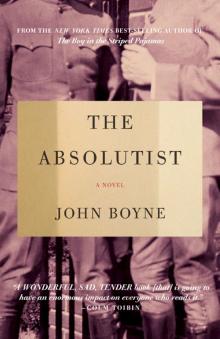- Home
- John Boyne
Next of Kin Page 3
Next of Kin Read online
Page 3
As a young woman Jane’s hair had been a pretty shade of blonde and now that she was in her forties the brightness of it had faded a little but that only made her seem even more knowing, more complex, more attractive. And she had cut it shoulder length recently too, a brave move that had worked wonders. Jane Bentley was not a woman who had any intentions of pretending to be anything other than her years and knew that her forties could be just as sensual as her twenties or thirties, even more so, if she allowed them to be. She didn’t suffer fools and had an aristocratic bearing that had taken her years to perfect.
‘What?’ she asked, turning around and noticing her husband staring at her. ‘What is it?’
‘Nothing,’ said Roderick, shaking his head. ‘You’re a beautiful woman, Jane. Do you realize that?’
She opened her mouth to make a joke but saw that he was being serious. She felt a rush of warmth for him, a gushing wave of appreciation. She had chosen well all those years ago, there was no question of that. Marriage to a kind and decent man who she didn’t love, or the creeping misery of remaining a spinster daughter in a family whose wealthy days were long behind them; there had been no real difficulty in making her decision. His comment required no reply; it was an honest compliment and she decided to take it as such.
Passing by the bed she picked up The Times for a moment and glanced at the headline, turning it around to face her husband for a moment, who looked away, closing his eyes.
‘Tomorrow’s fish wrappers,’ he said.
‘Royal sentence expected today,’ she announced, reading it aloud. ‘Bentley expected to be lenient.’
‘Don’t,’ said Roderick, shaking his head.
‘Royal sentence indeed,’ said Jane. ‘The boy is a third cousin of the king’s. It’s not as if he was in the direct succession. We’re all probably royal if those are the requirements.’
‘Well that’s the newspapers for you,’ said Roderick, harking back to his favourite theme. ‘They will exaggerate. That’s how they’ve sold so many papers off the back of this case. I should be on some sort of percentage commission.’
‘Nevertheless,’ she said. ‘Oh look, there’s a rather good picture of him here too. That’s unusual. Not a bad-looking boy I suppose, if you see him in the right light, although I’ve never been a fan of that Hanoverian jawline. None of them has a chin, it seems to me.’
‘He was on trial for the murder of a police officer, Jane,’ said Bentley. ‘Not for the aesthetic charm of his appearance.’
‘It’s sad, though, isn’t it?’ she asked. ‘He’s only the same age as Gareth. To have the rest of your life…’ She looked at her husband who was giving nothing away. ‘Well whatever happens to him, whatever the sentence, it’s unfortunate. I can’t imagine how his mother must feel, how I would feel if our son was in such a situation. I know it’s a terrible cliché but it’s impossible not to blame the parents in such a case, isn’t it? They must have set him a dreadful example.’
‘Our son would never find himself in such difficulties,’ insisted Roderick. ‘But it doesn’t matter who the defendant is, the law is the law. Whether you’re a third cousin of the king’s or the youngest and most illegitimate son of a fish trader from Cockfosters. The law is the law,’ he repeated.
Jane nodded and threw the paper back on the bed. ‘I’ll read it in the car,’ she said. ‘I better go and have my bath. And you can’t be the most illegitimate,’ she added for she was a stickler for grammar. ‘There are no superlatives. One is either a bastard or one is not.’
Roderick shrugged it off and continued to watch her as she left the room although he stayed seated until he heard her footsteps padding up the stairs to the bathroom on the third floor. Only then did he walk across to the bed and—against his better judgement—pick up the newspaper and look at it. It wasn’t the article he wanted to read, there was nothing that the reporters could tell him about this case that he didn’t already know; rather, he wanted to see the picture.
For almost six months now that young man had sat across from him in the dock, his expression changing from arrogant dismissal at the start to terrified anguish at the end and running the gamut of the emotional spectrum in the time in between. Caught by a photographer for the paper, however, being bundled into a Black Maria handcuffed to a middle-aged policeman, he looked startled, as if he couldn’t believe that this whole drama was actually drawing to a close and the curtain was about to descend on what, until now, he had viewed as little more than a disagreeable diversion. That he had been found guilty of murder and that he would either be spending the rest of his life in prison or be put to death. He appeared younger than his twenty-three years, almost like a little boy caught doing something he shouldn’t; he looked terrified.
Roderick threw the paper on the bed in exasperation at his own lack of judgement in looking at it in the first place.
‘One rule for all,’ he muttered fiercely between his teeth. ‘Paupers or kings. One rule for all.’
5
MARGARET RICHMOND WENT INTO the kitchen to check on the servants. A lot of things had changed during the nearly thirty years she had worked for the Montignacs but this was one of the rare occasions now when there was a full complement of staff on hand, although most had been hired especially for the day. When Andrew, Stella and Owen had been children there had been a full-time staff employed at Leyville: a butler, two footmen, a gardener, a cook, an upstairs girl, a downstairs girl and an in-between. And of course Margaret herself who looked after the children and supervised the girls. She had always rubbed along quite well with the butler, who managed the gardener, and the footmen, who came and went like the seasons.
But times had changed. After Ann Montignac’s death six years earlier, Peter had let half of them go.
‘We don’t need all these people hovering around,’ he had insisted. ‘I can look after myself, and Stella and Owen aren’t children any more either. Let them take care of themselves for a change. You can stop nannying them too, Margaret.’
Now there was just a part-time cook, one girl and no butler or footmen at all, and a couple of local girls who came in to clean and dust every day. Her own role was unspecified. She lived in hope that either Stella or Owen would marry and stay on at Leyville as she would then be the natural choice for nanny when the time came for them to have children. After all, she reasoned, she had only just turned sixty and had a lot left to offer yet. But there didn’t seem to be any sign of that happening. Stella had been seeing Raymond Davis for over a year and they had declared an engagement a few months earlier but there seemed no sign of them allowing that engagement to develop into a marriage. She suspected it would be one of those long-drawn-out affairs, beloved by the young these days, ending not in the purchase of a hat but in a separation. While Owen’s private life, of course, was a complete mystery to her. And so she just ran the household as best she could in the meantime. For the funeral she had hired a group of girls and young men from the local village and both Stella and Owen had seemed content for her to do so.
‘You might want to check on the guests,’ she stated firmly as she saw three of her charges standing in a corner of the kitchen, chatting to each other and smoking cigarettes. ‘Rather than standing around in here.’ They stared at her and frowned, slowly putting their cigarettes out, and walked back out towards the groups of mourners. Margaret was relieved. The last thing she wanted was an argument. Not on a day like this. But girls had to be watched, there were no two ways about that. She’d taken her eyes off one once and look at all the trouble that had caused.
She stepped out into the hallway again and considered joining the group in the drawing room but knew that she would only feel out of place among the gentry. She felt misplaced, the unwelcome drawing room to her left, the hostile kitchen to her right, and so stood perfectly still instead, wringing her hands nervously.
She tried not to think of Peter Montignac because if she did she would only think of Ann, who had not just been her employer but ha
d been her best friend as well, and if she thought of Ann she would think of Andrew, who she had loved as if he was her own. There was too much death there, she thought, and she didn’t want their pictures in her mind any more. To summon them up would only produce tears and she wanted no more tears until the guests had left. Instead she walked upstairs and paused outside the door of Owen’s room, leaning closer in to hear whether he was inside or not. She had seen him come through the front door a little earlier but he had gone straight upstairs, taking the steps two at a time as he went, and no one had laid eyes on him since. She tapped lightly on his door.
‘Owen,’ she said in a low voice. ‘Owen, are you in there?’
There was no answer.
‘Owen? Are you all right?’
A muffled sound, a cough from within. Then the word drifting out quietly, like a trail of smoke through the keyhole: ‘Fine.’
‘Do you want to come downstairs?’ she asked. ‘The guests…’ She trailed off, not knowing what to say about the guests. They were all perfectly content, drinking and eating, even the men who were forgetting themselves and playing billiards during a wake. After all, everyone—she knew—enjoyed a funeral.
‘Thank you, Margaret,’ came the voice from within.
The acknowledgement was also a dismissal and she nodded and went back downstairs, pausing halfway to rearrange a bouquet of flowers on the window sill, the better to give her more time to know what to do or where to go when she got there. She had been proud of her Owen that day, more proud than she had been of him in ten years when her love for him had changed so suddenly. What he had said in the church had moved and surprised her. Was there ever a boy who loved his uncle so? This boy that I raised, she thought. As much mine as theirs. This boy who I saved. She stood stock still, her eyes focused on nothing but the past, the childhoods, the finger paintings, the hugs, her babies.
A lady whose husband was the former Home Secretary from the billiard room emerged from the drawing room and touched her arm with the tip of a velvet-gloved finger, as if a servant was potentially riddled with disease and should be approached with caution.
‘It’s Miss Richmond, isn’t it?’ she asked.
‘Yes, ma’am.’
‘I wonder, would it be too much trouble to ask for some more tea? I asked one of those young girls but really, she looked right through me as if I was trouble personified.’
‘Right away, ma’am,’ said Margaret, happy to have a task again, happy to be of use. ‘Sorry, ma’am. I’ll see to it immediately.’
* * *
IN THE SMALL PARLOUR to the right of the kitchen Annie the cook was relaxing. Most of the food had been prepared the night before and the fresh sandwiches had been made that morning; there was little for her to do now but wait for the guests to leave and instruct the hired help about the cleaning arrangements afterwards, although she knew that Margaret Richmond would likely look after that too. Annie’s niece, a local girl called Millie, brought her a cup of tea. Millie was one of the girls who had been hired for the day but was hoping for a more permanent residency.
‘Precious little chance of that now, my girl,’ said Annie, shaking her head. ‘I can’t see me lasting here very much longer myself if I’m honest.’
‘But you’ve been here for years,’ said Millie.
‘Only eight years. That’s just a blow-in to an old family like this. And with just the two of them left now, what need do they have of a cook? That Owen hardly spends any time here as it is, he’s always gadding about in London, getting up to Lord knows what. And as for Stella…’ She rolled her eyes for she had disapproved of modern girls ever since her arms had turned flabby and her waistline had disappeared. ‘She’s no better than she ought to be. No, I wouldn’t be surprised if I got my marching orders soon enough too.’
Millie frowned. She would have to look elsewhere for employment then, and there were precious few opportunities to be found anywhere. ‘What was he like anyway?’ she asked, settling on a chair beside her aunt.
‘Who?’
‘Mr Montignac. Him as was buried today.’
Annie shrugged. ‘He was all right, I suppose,’ she said. ‘I’ve known worse. Not very friendly but not deliberately rude either. They say he was a lot different in the old days, before his first son died. His only son, I should say, as that Owen’s not his. But I didn’t know him well to tell you the truth. It was a shock, though, him going like he did.’
‘Really?’
‘Well he never seemed like he was on death’s door,’ said Annie. ‘Oh he had his problems of course. Heart problems. Stomach problems. Every kind of ailment known to mankind it seemed sometimes. Kept that doctor busy over the last few years and no mistake. But he ate like it was going out of style and always had his meat cooked so rare that any half-decent vet could have brought it back to life. And then suddenly, just out of the blue, that was it.’ She clicked her fingers together dramatically. ‘Gone.’
‘It seems a shame to have such a big house for only two people,’ said Millie, imagining for a moment what it would be like to be mistress of it; Owen Montignac had caught her eye earlier in the day when he had returned from the funeral and she’d stared at him, transfixed, as he ran up to his room, her heart beating faster inside her chest as she saw what appeared to be a pained expression on his extraordinarily handsome face. She had never seen a young man with such white hair before, nor with eyes of such a piercing blue.
‘His father was the same,’ said Annie. ‘Married a Frenchwoman, if you please.’
‘He’s very handsome,’ said Millie, lost in thought.
‘I wouldn’t set much store by that.’
‘Not like most of the others round here.’
‘Everything’s changing,’ complained Annie. ‘People don’t live in houses like these any more. They can’t afford to, most of them. Costs run too high. They all live up in London in townhouses and fancy flats and keep their country retreats locked up all year round. They’re just for show now, most of them.’
‘Is that what Mr Montignac is planning on doing?’
‘Well I don’t know, do I?’ said Annie, laughing as she took a long drag on her cigarette. ‘He doesn’t let the likes of me into his thoughts. He’s like his father that way. His uncle, I mean. Doesn’t have much time for anyone on the staff, except maybe Margaret Richmond. But then she practically brought him up from the day he came here.’
At that moment the lady in question walked through the door and Millie stumbled to her feet quickly while Annie remained unmoved, refusing to acknowledge the older lady’s authority.
‘I’m getting questions about the tea, Annie,’ said Margaret in a tired voice.
‘The tea?’
‘The lack of it.’
Annie shuffled in her chair and dragged herself up as if she was carrying a ton weight and the effort was almost too much for her. She stepped past Margaret without acknowledging her and went into the kitchen to issue short, sharp orders.
‘And … Mildred, is it?’ asked Margaret.
‘Millie, ma’am.’
‘Millie, yes. Perhaps you would go and check on the gentlemen in the billiard room. I don’t hold with the playing of games on a day like today but they will insist.’
‘Yes, ma’am,’ said Millie, blushing scarlet as she was spoken to and leaving the room.
Margaret glanced around the parlour irritably when it was empty, annoyed that everything was left to her. If only Stella or Owen could circulate a little bit, she thought, thank the guests for coming, then everything would be so much easier.
6
LEONARD BROUGHT THE CAR around to the front door of the house on Tavistock Square, driving slowly so as not to knock over any of the reporters who were loitering outside, despite his desire to do that very thing. A couple of them tapped on the window, throwing a few random questions at him through the glass, but these came only from the most inexperienced journalists; the rest knew that the chauffeur would neither say anything t
o them nor have anything interesting to say.
‘Ready?’ asked Roderick, as his wife checked her appearance one final time in the hallway mirror. It was a quarter past ten already and he was anxious to leave.
‘Ready,’ she said, nodding her head.
‘And remember—not a word to any of them,’ he reminded her as he opened the door and they stepped out on to the street to be greeted by more than a dozen newspapermen, pencils poised in anticipation above their notebooks as they peppered him with questions.
‘Will you be passing sentence today, Your Honour?’
‘Have you spoken to the palace, sir?’
‘Will it be life or death, Judge? Life or death? Will he be treated the same as everyone else?’
Roderick kept his head down and marched determinedly towards the car, whose back door Leonard had opened and was standing beside protectively. Jane, as requested, kept her mouth shut but her head held high and she smiled at the gathered throng, disappointed that there were no photographers present. There were sure to be some at the Old Bailey, though, she knew that much. She was wearing a new hat for the occasion.
‘Drive on, Leonard,’ said Roderick once they were safely inside with the doors closed again. ‘And quick as you like.’
‘Yes, sir,’ came the reply from the front seat as the car shifted into gear and they turned out of the square en route to the Palace of Justice.
‘I don’t think I can take much more of these damn busybodies,’ said Roderick, feeling a little more relaxed now that they were on the move. ‘What kind of a job is that anyway?’
‘People are interested, Roderick,’ said Jane, shrugging her shoulders as if it was the most natural thing in the world. ‘You can’t blame them for that. It’s human nature. It’s also their job.’
Bentley grunted and watched out the window. Summer had started to make its arrival felt. The trees along Southampton Row had sprung into life and he noticed one or two brave souls who had changed their winter jackets for lighter ones. It was an uncommonly warm June morning.

 Beneath the Earth
Beneath the Earth The Boy in the Striped Pajamas
The Boy in the Striped Pajamas Next of Kin
Next of Kin The House of Special Purpose
The House of Special Purpose A Ladder to the Sky
A Ladder to the Sky A History of Loneliness
A History of Loneliness The Heart's Invisible Furies
The Heart's Invisible Furies The Boy at the Top of the Mountain
The Boy at the Top of the Mountain Stay Where You Are and Then Leave
Stay Where You Are and Then Leave Crippen: A Novel of Murder
Crippen: A Novel of Murder The Absolutist
The Absolutist Mutiny: A Novel of the Bounty
Mutiny: A Novel of the Bounty A Traveler at the Gates of Wisdom
A Traveler at the Gates of Wisdom The Congress of Rough Riders
The Congress of Rough Riders The Thief of Time
The Thief of Time The Boy in the Striped Pajamas (Deluxe Illustrated Edition)
The Boy in the Striped Pajamas (Deluxe Illustrated Edition) The Terrible Thing That Happened to Barnaby Brocket
The Terrible Thing That Happened to Barnaby Brocket The Boy In The Striped Pyjamas
The Boy In The Striped Pyjamas Crippen
Crippen